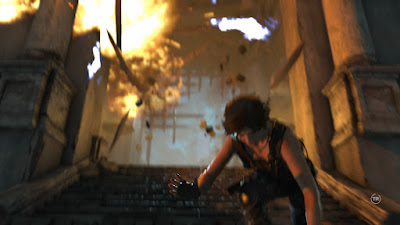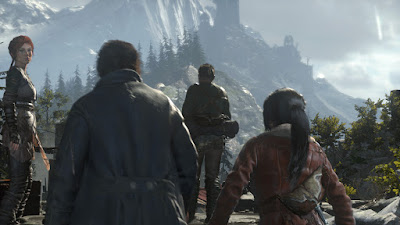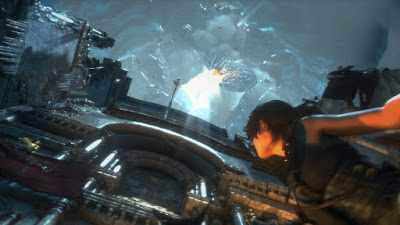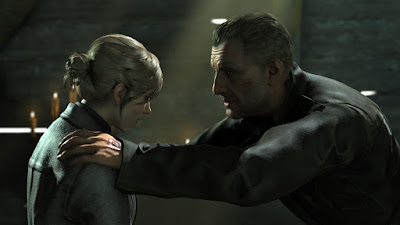I realized that my propensity for reading theology is directly proportional to the level of distress I feel over the state of the world. In the dark years of the Bush presidency, I devoured Kierkegaard in a quest to understand my place in the world, and Yoder in an effort to articulate my outrage over the invasion of Iraq. During Obama's reign, when we started very slowly moving in the direction of more kindness, I spent very little time or thought on theology. Now, as we seem to be lurching towards the apocalypse, the words and actions of Bonhoeffer feel incredibly urgent and relevant.
There are four main sections to the book. The first, "Grace and Discipleship", is an extremely powerful denunciation of the slippery tendency for Protestants to bask in the assurance of promised salvation. The core of this church is "by grace and not by works," and God has infinite grace, so it's tempting to believe that nothing is required of the believer: perhaps go to church and be told that you're going to heaven. Bonhoeffer calls this "cheap grace": grace that asks nothing of the recipient. As a Lutheran, he digs deep into Luther's own experience as a monk in the Catholic church, arguing that this was not at all Luther's intention, and in fact an inversion of his goal. Rather, Bonhoeffer believes, Luther sought to open up the demands of monastic discipline to the entire church. One is still saved through grace, and it's a grace that transforms your life. You cannot continue to live comfortably and idly, ignoring the suffering of the world, focused on your own pleasure. Grace is the grace to follow in Christ's footsteps, to lose everything of this world and gain everything of the next. It's a very powerful argument, discomforting in a really good way.
The second section is a long but very thoughtful and methodical walk through the Sermon on the Mount. I was looking forward to this, and thought it was good, but in a very different way than I had expected. I often point to the Sermon on the Mount as my favorite passage in the Bible, and it almost perfectly encapsulates my ideals of a moral life: compassion, humility, pacifism, acceptance, generosity, mercy. It's a radical document that flies in the face of our human nature and calls us to be better: turning the other cheek instead of fighting back when we are struck, abandoning the pursuit of money and possessions. I think I was sort of expecting Bonhoeffer to underline these values. He kind of does, but his main goal here is to explain where the call comes from, not what it's calling you to do. He isn't saying that these are good moral teachings that we should follow. He's saying that these are Christ's commandments, and that they're so extreme that only those who genuinely have been called will follow them. This isn't a path for fellow-travelers: it's an exclusive calling demanded of the elect. Again, this section was uncomfortable, which is good... it's an ongoing process of me re-evaluating what these words mean to me.
This is followed by "The Messengers", which wanders over a wider range of the Gospels but has a very similar thesis. Building on the two previous sections, this looks at all the various ways in which the Apostles were called and what they had to do. Their whole world was upended: not only giving up their livelihood to travel itinerantly with Jesus, but turning their backs on their families and even their faith. I think it's often tempting for us to think that we can know a religion is good and/or correct by checking whether its teachings are moral. Bonhoeffer isn't having any of that. Morality isn't an external barometer by which we can judge God. Nor is it an absolute that God is striving to reach. Rather, morality flows from God. We might believe that honoring our father and mother is virtuous, but if God calls an apostle to abandon his parents, then that is the virtuous thing to do.
Of course, to a non-Christian this all sounds dangerous and possibly harmful, the same sort of fanaticism responsible for much of the evil in the world today. Making morality the fruit of the church, and not the church the fruit of morality, feels risky; but I think it's that conviction that gave Bonhoeffer and others like him the courage to do what they did. Our own personal values can change and slide over time, in response to our personal circumstances and the people around us and the news we read and the temptations we face and the threats we fear. The unacceptable becomes acceptable, the beloved becomes shunned, the line that cannot be crossed is crossed and then ignored. But, if someone stays centered on God's word, and looks to it rather than their own desires and fears, then they will continue to do what it says is right, even in the face of opposition.
"The Messengers" ends with a chapter called "The Fruit". It's primarily about recognizing whether a teacher (a pastor or theologian or other figure) is actually a Christian or leading people astray. I don't think Bonhoeffer was thinking of himself at all while writing this, but I was struck by how the fruit he bore in his own life testifies to the working of his mind and soul.
The final section of the book is "The Church and the Life of Discipleship." Honestly, this was the least meaningful for me... it definitely isn't bad, but didn't feel nearly as eye-opening as the earlier parts of the book. Part of that may have just been fatigue on my part, but I think a lot of it was retreading well-established doctrine, as well as perennial disputes such as baptism. The content is still good on its own terms, just not as surprising and radical as the rest of the book.
While reading, I made note of several passages that particularly spoke to me. I have to admit that I was kind of thinking of maybe posting some of them on Facebook or something, but very quickly realized that that would be a bad idea, and kind of defeat the point. Unlike the vast majority of writers, Bonhoeffer wasn't out to convince the most people or to try and win over the world to his cause. In fact, I think he'd be the first to say that this book isn't aimed at non-Christians. All of its arguments and pleas flow from the central assumption of Christ's call to the individual, and all of his excellent conclusions are only (but thoroughly!) predicated on faith, discipleship, and, yes, grace.
That said, for posterity's sake, here are the passages that particularly spoke to me now in 2017. (All citations taken from the 1967 printing. Transcribed by hand, please pardon typos.)
If Grace is God's answer, the gift of Christian life, then we cannot for a moment dispense with following Christ. But if grace is the data for my Christian life, it means that I set out to live the Christian life in the world with all my sins justified beforehand. I can go and sin as much as I like, and rely on this grace to forgive me, for after all the world is justified in principle by grace. I can therefore cling to my bourgois secular existence, and remain as I was before, but with the added assurance that the grace of God will cover me. It is under the influence of this kind of "grace" that the world has been made "Christian," but at the cost of secularizing the Christian religion as never before. The antithesis between the Christian life and the life of bourgeois respectability is at an end... It is terrifying to realize what use can be made of a genuine evangelical doctrine. In both cases we have the identical formula - "justification by faith alone." Yet the misuse of the formula leads to the complete destruction of its very essence. (p. 42)
At the end of a life spent in the pursuit of knowledge Faust has to confess: "I now do see that we can nothing know." That is the answer to a sum, it is the outcome of a long experience. But as Kierkegaard observed, it is quite a different thing when a freshman comes up to the university and uses the same sentiment to justify his indolence. As the answer to a sum it is perfectly true, but as the initial data it is a piece of self-deception. For acquired knowledge cannot be divorced from the existence in which it is acquired. (p. 43)
We Lutherans have gathered like eagles round the carcase of cheap grace, and there we have drunk of the poison which has killed the life of following Christ. (p. 44) (Note: I, uh, think that Germans have a less reverential view of eagles than Americans do.)
Jesus prays to his Father that the cup may pass from him, and his Father hears his prayer; for the cup of suffering will indeed pass from him - but only by drinking it... Within the fellowship of Christ's suffering, suffering is overcome by suffering, and becomes the way to communion with God. Suffering has to be endured in order that it may pass away... But the Church knows that the world is still seeking for someone to bear its sufferings, and so, as it follows Christ, suffering becomes the Church's lot too and bearing it, it is borne up by Christ. (p. 81)
In the same way his followers are also called upon to bear, and that is precisely what it means to be a Christian. Just as Christ maintained his communion with the Father by his endurance, so his followers are to maintain their communion with Christ by their endurance. (p. 82)
We are separated from one another by an unbridgeable gulf of otherness and strangeness which resists all our attempts to overcome it by means of natural association or emotional or spiritual union. There is no way from one person to another. However loving and sympathetic we try to be, however sound our psychology, however frank and open our behavior, we cannot penetrate the incognito of the other man, for there are no direct relationships, not even between soul and soul. Christ stands between us, and we can only get into touch with our neighbours through him. That is why intercession is the most promising way to reach our neighbours, and corporate prayer, offered in the name of Christ, the purest form of fellowship. (p. 87-88)
As if their own needs and their own distress were not enough, they take upon themselves the distress and humiliation and sin of others. They have an irresistible love for the down-trodden, the sick, the wretched, the wronged, the outcast and all who are tortured with anxiety... If any man falls into disgrace, the merciful will sacrifice their own honor to shield him, and take his shame upon themselves. They will be found consorting with publicans and sinners, careless of the shame they incur thereby. In order that they may be merciful they cast away the most priceless treasure of human life, their personal dignity and honor. (p. 100-101)
They are told that they must not only have peace but make it. And to that end they renounce all violent and tumult.... His disciples keep peace by choosing to endure suffering rather themselves rather than inflict it on others. They maintain fellowship where others would break it off. They renounce all self-assertion, and quietly suffer in the face of hatred and wrong. (p. 102)
"Blessed are they that have been persecuted for righteousness' sake: for theirs is the kingdom of heaven." This does not refer to the righteousness of God, but to suffering in a just cause, suffering for their own judgments and actions. For it is by these that they who renounce possessions, fortune, rights, righteousness, honour, and force for the sake of following Christ, will be distinguished from the world. The world will be offended at them, and so the disciples will be persecuted for righteousness' sake. Not recognition, but rejection, is the reward they get from the world for their message and works. It is important that Jesus gives his blessing not merely to suffering incurred directly for the confession of his name, but to suffering in any just cause. They receive the same promise as the poor, for in persecution they are their equals in poverty. (p. 102-103)
That is the peculiar quality of salt. Everything else needs to be seasoned with salt, but once the salt itself has lost its savour, it can never be salted again. Everything else can be saved by salt, however bad it has gone - only salt which loses its savour has no hope of recovery. (p. 105) (Note: I think I would have really enjoyed Bonhoeffer's cooking!)
By confounding God and the law, the Jews were trying to use the law to exploit the Law-giver: He was swallowed up in the law, and therefore no longer its Lord. By imagining that God and the law could be divorced from one another, the disciples were trying to exploit God by their possession of salvation. In both cases, the gift was confounded with the Giver: God was denied equally, whether it was with the help of the law, or with the promise of salvation. (p. 111)
For the Christian, worship cannot be divorced from the service of the brethren... When we come before God with hearts full of contempt and unreconciled with our neighbours, we are, both individually and as a congregation, worshipping an idol.... Not just the fact that I am angry, but the fact that there is somebody who has been hurt, damaged and disgraced by me, who 'has a cause against me', erects a barrier between me and God. Let us therefore as a Church examine ourselves, and see whether we have not often enough wronged our fellow-men. Let us see whether we have tried to to win popularity by falling in with the world's hatred, its contempt and its contumely. For if we do that we are murderers... Let the fellowship of Christ examine itself and see whether it has given any token of the love of Christ to the victims of the world's contumely, and contempt any token of that love of Christ which seeks to preserve, support and protect life. Otherwise however liturgically correct our services are, and however devout our prayer, however brave our testimony, they will profit us nothing, nay rather, they must needs testify against us that we have as a Church ceased to follow our Lord. God will not be separated from our brother... He who says he loves God and hates his brother is a liar. (p. 116-117)
This saying of Christ removes the Church from the sphere of politics and law. The Church is not to be a national community like the old Israel, but a community of believers without political or national ties... It has abandoned political and national status, and therefore it must patiently endure aggression. (p. 127)
If I am assailed, I am not to condone or justify aggression. Patient endurance of evil does not mean a recognition of its rights. That is sheer sentimentality, and Jesus will have nothing to do with it. The shameful assault, the deed of violence and the act of exploitation are still evil. The disciple must realize this, and bear witness to it as Jesus did, just because this is the only way evil can be met and overcome... Suffering willingly endured is stronger than evil, it spells death to evil. There is no deed on earth so outrageous as to justify a different attitude. The worse the evil, the readier must the Christian be to suffer. (p. 128)
There were those who insulted and derided them for their weakness and humility. There were those who persecuted them as prospective dangerous revolutionaries and sought to destroy them. Some of their enemies were numbered among the champions of the popular religion, who resented the exclusive claim of Jesus... Over and above all these, the disciples also had to contend with the hostility which invariable falls to the lot of those who refuse to follow the crowd, and which brought them daily mockery, derision and threats... From now on there can be no more wars of faith. The only way to overcome our enemy is by loving him. (p. 131-132). (This is a challenging call to me right now.)
We must love not only in thought and word, but in deed, and there are opportunities of service in every circumstance of daily life... Let us show our love towards our enemy... Nowhere is service more necessary or more blessed than when we serve our enemies... Jesus does not promise that when we bless our enemies and do good to them they will not despitefully use and persecute us. They certainly will. But not even that can hurt or overcome us, so long as we pray for them... Their persecution of us only serves to bring them nearer to reconciliation with God and to further the triumph of love. (p. 134)
But this raises the question of the relation between the Christians and their non-Christian neighbours. Does their separation from the rest of society confer on them special rights and privileges? Do Christians enjoy power, gifts and standards of judgement which qualify them to exert a peculiar authority over others? How easy it would have been for the disciples to adopt a superior attitude, to pass unqualified condemnation on the rest of the world, and to persuade themselves that this was the will of God! That is why Jesus has to make it clear beyond all doubt that such misunderstandings would seriously imperil their discipleship. The disciples are not to judge. If they do so, they will themselves be judged by God. The sword wherewith they judge their brethren will fall upon their own heads. (p. 162-163)
If the disciples make judgements of their own, they set up standards of good and evil. But Jesus Christ is not a standard which I can apply to others. He is a judge of myself, revealing my own virtues to me as something altogether evil. Thus I am not permitted to apply to the other person what does not apply to me... Judgement is the forbidden objectivization of the other person which destroys single-minded love. I am not forbidden to have my own thoughts about the other person, to realize his shortcomings, but only to the extent that it offers to me an occasion for forgiveness and unconditional love. (p. 164)
Judging others makes us blind, whereas love is illuminating. By judging others we blind ourselves to our own evil and to the grace which others are just as entitled to as we are... If when we judged others, our real motive was to destroy evil, we should look for evil where it is certain to be found, and that is in our own hearts. But if we are on the look-out for evil in others, our real motive is obviously to justify ourselves, for we are seeking to escape punishment for our own sins by passing judgement on others. (p. 165)
But the Christian is not only forbidden to judge other men: even the word of salvation has its limits. He has neither power nor right to force it on other men in season and out of season. Every attempt to impose the gospel by force, to run after people and proselytize them, to use our own resources to arrange the salvation of other people, is both futile and dangerous. It is futile, because the swine do not recognize the pearls that are cast before them, and dangerous, because it profanes the word of forgiveness, by causing those we fain would serve to sin against that which is holy. Worse still, we shall only meet with the blind rage of hardened and darkened hearts, and that will be useless and harmful. Our easy trafficking with the word of cheap grace simply bores the world to disgust, so that in the end it turns against those who try to force on it what it does not want. (p. 165, again!)
The disciples are not expected to show fear of men, nor malice, nor mistrust, still less a sour misanthropy, nor that gullible credulity which believes that there is good in every man: they are expected rather to display an unerring insight into the mutual relation of the Word and man. If they are content not to pitch their hopes too high, they will not be perturbed when Jesus warns them that their way among men will be one of suffering. (p. 191)
'In the flesh' a brother, says St Paul with emphasis, thus warning Philemon against those misunderstandings to which all 'privileged' Christians are liable. Such Christians are prepared to tolerate the society of Christians of lower social standing in church, but outside they give them the cold shoulder. Instead, Philemon must welcome Onesimus as a brother, nay, as if he were St Paul himself. (p. 231)
The Church can never tolerate any limits set to the love and service of the brethren. For where the brother is, there is the Body of Christ, and there is his Church. And there we must also be... If the world despises one of the brethren, the Christian will love and serve him. If the world does him violence, the Christian will succour and comfort him. If the world dishonours and insults him, the Christian will sacrifice his own honour to cover his brother's shame. Where the world seeks gain, the Christian will renounce it. Where the world exploits, he will dispossess himself, and where the world oppresses, he will stoop down and raise up the oppressed. If the world refuses justice, the Christian will pursue mercy, and if the world takes refuge in lies, he will open his mouth for the dumb, and bear testimony to the truth. (p. 232-233)
Wow, that ended up being a lot longer than I thought it would. Sorry! Honestly, either this is all totally irrelevant to you or you'd be better served by just reading the book.
There's a saying that's been floating through the social networks over the last couple of days: "If you ever sat in history class and wondered, 'What would I do?' the answer is: this. Whatever you're doing right now is what you would have done then." I'm glad to have done what I have (opened my wallet to organizations defending the weak, joined my body and my voice to demonstrations and protests). But, honestly, it's been very easy so far: I still live a life of comfort, and I'm fortunate enough to be surrounded by like-minded people and a local culture that protects dissent. I'm not a courageous person, and things will likely get much, much worse. I hope that I can find a source of strength and determination that will help guide me through the storm ahead.






























































